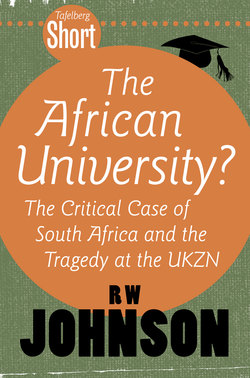Читать книгу Tafelberg Short: The African University? - RW Johnson - Страница 5
На сайте Литреса книга снята с продажи.
ОглавлениеLost in translation
In addition, of course, many Third World countries underwent a revulsion against the old colonial culture, a process with dangers of its own because one of the strongest colonial vestiges was the former oppressor's language, which had the crucial advantage of connecting to a world culture. North Africa, for all that it harbours the University of Al-Karaouine (Morocco), established in 859 and the oldest continuously operating university in the world, displays all the varieties of this negation.
Libya, which boasts fourteen universities, has been an educational desert: how could it be otherwise in the era of Gaddafi's Green Book? Egypt enrols no less than 30% of the young age group as students but at least half drop out from the public universities, whose educational level is described by The Economist as ‘abysmal’. But it also boasts private American, British, French, German and Russian universities.
Tunisia, which had no universities before independence in 1956, now has thirteen of them and devotes a large 7.2% of its budget to education, more than any European or North American country. After independence it ushered in a partial Arabisation, which basically means that Arabic is used for all post-primary education but French still reigns supreme in maths, science, vocational, technical and professional training.
Morocco followed the same path and has devoted considerable resources to the development of science and technology. US institutions have been active in helping this effort and, after Gaddafi's fall, they have veritably swarmed into Libya, so that there is an increasing use of English in both countries. Morocco's flagship, Mohammed V University (which split into two in 1993), commands international respect.
Algeria provides the contrast and is of some significance: now that Sudan has broken in two, it is Africa's largest country. Its bitter war against the French left a mood of intransigence that continues to inflect higher education, with dire results. The University of Algiers, established in 1909, was by a great margin the most important modern university in North Africa and while it remained Francophone, it was able to call on good French-language teachers in a wide range of subjects. Yet at independence in 1962 the university had only 2 200 Arab students. Since then the number of universities has multiplied to 47, with 267 000 students. However, here Arabisation was pushed all the way, although it was always obvious that doing away with French altogether would cripple higher education – not only cutting off students and academics from a world culture but also ensuring that French academics could no longer come to teach there. But by 1997 all education, including higher education, had been Arabised.
The results have been catastrophic, particularly since 45% of the population speaks Berber, not Arabic, while even most Arabs are not conversant with literary Arabic, and there is a huge shortage of competent Arab teachers, not to mention key academic books in Arabic. Webometrics, an Internet firm that ambitiously tries to rank universities way beyond the conventional top 500, ranks the two best Algerian universities, Abu Bakr Belkaid University and the University of Batna, as numbers 4 132 and 5 559 respectively.
Morocco illustrates the opposite. By 2006 it offered over 40 relocated French university programmes up to master's level – and at an entirely acceptable standard. The results have been dramatic. The number of Moroccans studying abroad has fallen from 59 000 to 42 000, as students flock to these internationally recognised degree courses, while there are now over 5 000 foreign students studying in Morocco, usefully paying fees to its universities. If you want a good French degree at lower cost in a warmer climate, Morocco's the place.
This choice, the Algeria/Morocco choice if you like, is faced by other institutions throughout Africa. Put bluntly, it is the choice between nationalist fundamentalism and globalisation. There are Moroccan scientists working at Nasa now (on climate change), but it's difficult to imagine that happening with Algerians. And while few universities were willing to shoot themselves in the foot as badly as the Algerians, everywhere they took pride in throwing off their old links with Leuven, Paris or London. This undoubtedly had a cost: academic exchange withered, the colonial universities became more parochial, and standards deteriorated.
But there were variations. In Senegal higher education, linked to the universities of Bordeaux and Paris, has a long history. In the colonial period the Institut Français d'Afrique Noire (Ifan) had a major centre in Dakar and branches in most other Francophone countries, performing much the same role as did the Rhodes-Livingstone Institute in Lusaka, with an international reputation in the social sciences. In the independence period Ifan came to stand for Institut Fondamental d'Afrique Noire, and Dakar University became Cheikh Anta Diop University with 60 000 students. Renaming one's chief university after an ideologue associated with historical invention and obscurantism was, however, merely an Africanist gesture; the whole university remains completely Francophone and is still the leading such institution in French-speaking Africa.
A similar path has been followed in Tanzania, now in theory a Swahili-speaking country – but tertiary education continues to be in English. A similar compromise is found in many other countries.
